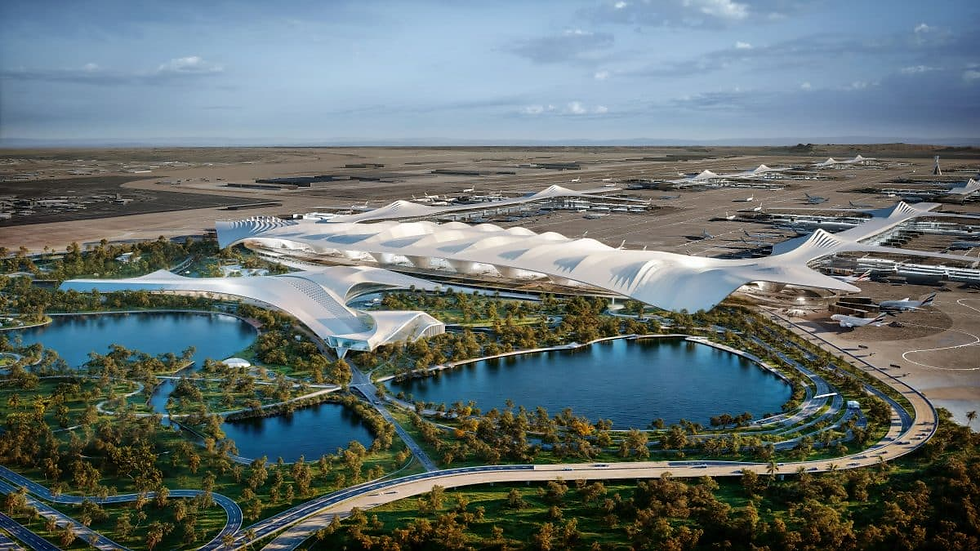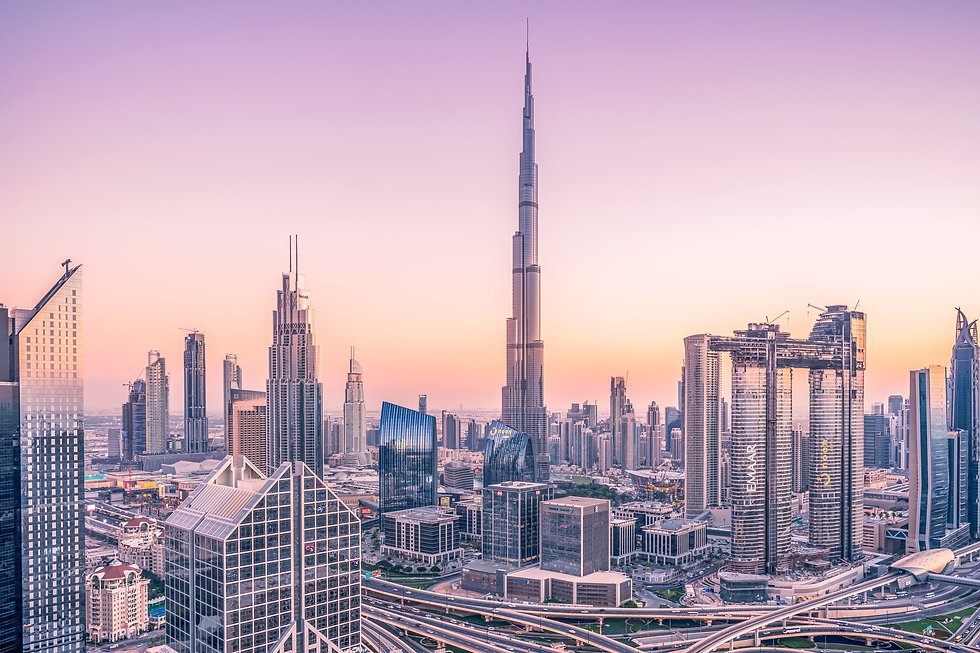Is Dubai's Record-Breaking Real Estate Market Growth Sustainable?
- Stephen James Mitchell

- Jun 6, 2024
- 6 min read
Updated: Aug 5, 2025

Dubai's real estate market has consistently captured global attention, recently breaking records with 17,139 sales transactions in May 2024. This unprecedented growth raises a critical question: Is Dubai's real estate market growth sustainable? This article explores the factors driving Dubai's real estate market and why it remains a robust investment opportunity.
With a steady influx of private capital, ongoing urbanization trends, and innovative sustainable developments, Dubai's real estate market seems poised for sustained growth. The city's strategic initiatives, such as the Dubai 2040 Urban Master Plan, aim to accommodate a rapidly growing population and enhance its global appeal, further boosting demand for residential and commercial properties.
For many investors, this presents a unique opportunity to capitalize on a market with a promising future. However, the critical question remains: will the supply of new housing units outpace demand, leading to an oversupply, or will the growing population absorb the new stock? Careful analysis of demographic trends and strategic urban planning will be essential to ensure the market's continued stability and growth.
Dubai's Journey to 2040: What's on the Horizon?
Dubai is on a transformative journey. In 2021, Sheikh Mohammed bin Rashid Al Maktoum announced the Dubai 2040 Urban Master Plan, aiming to double the city’s size and make Dubai the world's best city for living. Under the plan, the city's population is projected to grow to 7.8 million by 2040. This ambitious plan includes the development of five new urban centers, each designed to foster economic growth and provide a mix of residential, commercial, and recreational spaces.
The plan also allocates 1.7 billion square feet of land for industrial and economic activities, along with a substantial 134% increase in space dedicated to hospitality and tourism, solidifying Dubai's reputation as a premier global destination. The strategic expansion aims to accommodate the city's growing population while enhancing its attractiveness to tourists and investors alike.
A significant milestone in this plan is the recent approval of the expansion of Al Maktoum International Airport. Set to become the world’s busiest international airport and the largest supply chain and logistics hub, this development is expected to drive substantial economic growth. The airport expansion alone is anticipated to create a need for homes for over 1 million people in Dubai South by 2033, further emphasizing the urgency of the city's housing and infrastructure development.

Understanding the Projected Population Growth
As of May 2024, Dubai's population stands at approximately 3.69 million, reflecting an increase of over 100,000 new residents in 2023. To meet the target set by the government, Dubai's population needs to reach 7.8 million by 2040, necessitating an annual growth rate of roughly 7%. This rapid population increase underscores the urgent need for expanded housing and infrastructure, presenting significant opportunities for real estate investors. With such ambitious growth targets, the demand for residential and commercial spaces in Dubai is set to rise substantially, driving further development and investment in the city's real estate market.
Currently, Dubai's housing stock can accommodate about 3.3 million people, with an average household size of 4.9 people, which is higher than most typical urban centers. This translates to approximately 752,041 housing units. However, to meet the projected population of 7.8 million by 2040, Dubai will need approximately 1,591,837 housing units, assuming the average household size remains constant. This means an additional 839,796 units will be required over the next 16 years. Given the current rate of new housing projects, which amounts to around 400,000 units over 16 years, there is a clear opportunity for real estate developers to fill this gap.

In addition to the rapid rise in demand for permanent residences, many more units will be required to provide short-term accommodation for the anticipated increase in tourists and visitors. Dubai continues to bolster its position as a global travel and tourism center and a regional hub for gaming, exhibitions, and events. This sector's growth significantly impacts the housing market, as many tourists seek short-term rentals rather than traditional hotel stays, driving the demand for diverse residential offerings.
Furthermore, a significant number of units are purchased by investors from less stable economies as a dollar-pegged way to park capital outside their home countries. Often, these properties, although part of the housing stock, are kept vacant and not available for accommodation. This trend not only affects the housing availability but also highlights the city's appeal as a secure investment destination.
All these factors—the population boom, tourism influx, and investment trends—underscore the critical need for more housing development in Dubai. Addressing these demands will require strategic planning and robust investment in infrastructure, ensuring that Dubai's growth trajectory remains sustainable and continues to attract global interest.
Is Dubai’s Population Growth Target Achievable?
Urbanization is a global megatrend. By 2040, approximately 65% of the global population is expected to live in urban centers. With the global population projected to reach around 9.2 billion, Dubai would only need to attract approximately 0.044% of the global population to increase its population to 7.8 million by 2040. Considering Dubai's positioning as one of the top cities in the world to live in, this is a small percentage in the grand scheme of things.
Dubai's economic stability, safety, infrastructure, tax-friendly status, luxurious amenities, and strategic position as a global travel hub make it an attractive destination for residents and investors alike. The city's proactive approach to economic diversification, focusing on sectors such as tourism, finance, technology, and trade, ensures a stable and resilient economy. Dubai's commitment to providing a high quality of life for its residents is evident in its world-class healthcare, education, and recreational facilities. The city's multicultural environment, with a mix of over 200 nationalities, offers a vibrant and inclusive community. Its strategic location, with easy access to major markets in Asia, Europe, and Africa, further enhances its appeal as a global business hub.
Additionally, the average price per square meter in Dubai is significantly lower compared to other major cities. For instance, property in Dubai is priced at 27% of the cost in Hong Kong and 58% of the cost in London and Munich. This affordability, combined with Dubai's strategic position as a global travel hub, enhances its appeal to potential residents and investors alike. According to the UBS Global Real Estate Bubble Index, Dubai’s property prices and the increase in value are fair. Dubai ranks 23rd, which is third from the bottom of the index, indicating that it’s one of the least likely cities on the index to be a bubble.
By the end of 2023, the average property price in the US had increased by 85% from pre-2008 global financial crisis levels, while the UK saw a 55% increase. In contrast, Dubai's property prices had only increased by 9%. This indicates substantial headroom for growth, making Dubai's real estate market a promising investment opportunity.
The combination of economic diversification, affordable real estate, and strategic global positioning paints a compelling picture for Dubai’s future. As the world continues to urbanize, Dubai's forward-thinking policies and attractive living conditions are likely to draw in the global population, achieving its ambitious growth targets. This strategic vision not only enhances Dubai’s appeal but also positions it as a leading global city, fostering a robust and sustainable real estate market for years to come.

So, is Dubai's record-breaking real estate market growth sustainable?
The evidence strongly suggests that it is. The city's growth trajectory, supported by the Dubai 2040 Urban Master Plan and substantial government investments in infrastructure, indicates a significant and sustained demand for housing. If current trends continue, there will likely be a shortage of housing, highlighting a substantial investment opportunity.
For real estate investors, Dubai offers a unique opportunity to capitalize on this growth. The city's robust economic outlook, strategic location, and attractive living conditions make it a prime destination for real estate investment. The combination of economic diversification, affordable real estate, and strategic global positioning paints a compelling picture for Dubai’s future. As the world continues to urbanize, Dubai's forward-thinking policies and attractive living conditions are likely to draw in the global population, achieving its ambitious growth targets. As Dubai continues to expand and evolve, the potential for investment returns in the real estate market remains strong.
Thus, investing in Dubai's real estate market is not only a sound financial decision but also a strategic move aligned with the city's future growth and development plans.
As the Managing Director of Global Investments, I bring 25+ years of expertise in finance, wealth management, and real estate. I specialize in portfolio diversification, deal structuring, and wealth preservation, delivering data-driven strategies for sustainable success in global markets.




Comments